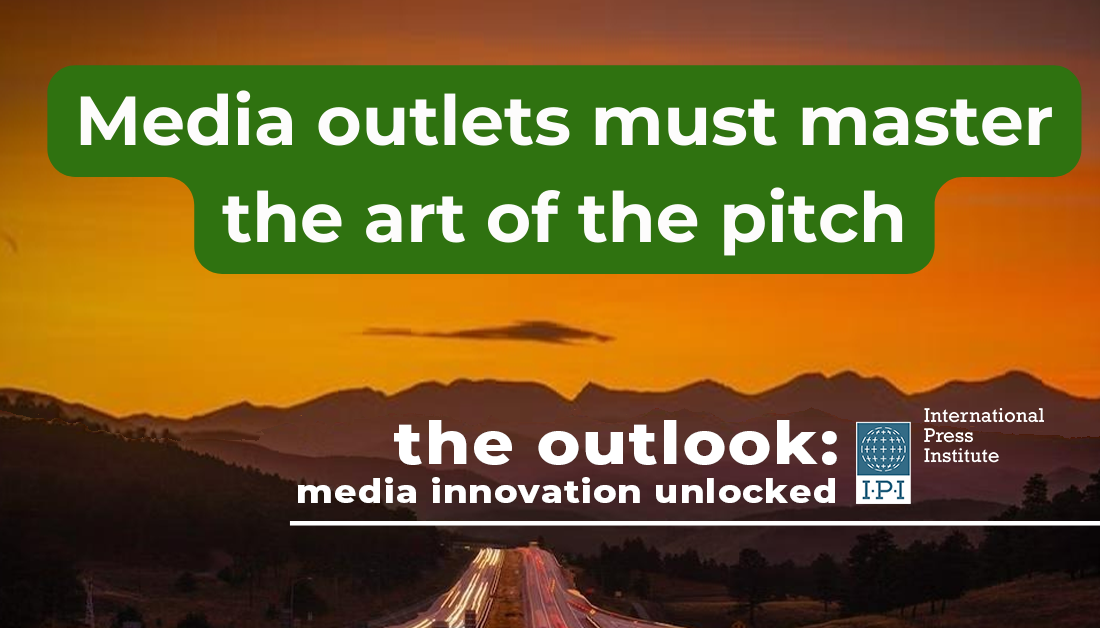This text comes from IPI’s newsletter The Outlook. Click here to sign up to receive future editions direct to your inbox.
This is The Outlook, IPI’s media innovation newsletter, where we take a look at tools and strategies for innovation, and learn from newsrooms that are implementing them.
Today we are sharing some of the tips from our Local News Accelerator sessions on pitching your media, whether that’s to potential subscribers, investors, donors or advertisers.
This was one of the most popular elements of our four-month training and coaching programme for local and niche media, so we’re shining a light on why it’s something you should be thinking about, and how to get started.
The challenge: Diversifying revenue streams necessitates sharp sales skills
Subscription- and membership-focused media need to demonstrate value to readers. Non-profit media are often reliant on reaching new donors. Small organizations may want partners to collaborate with on products or projects.
If advertising is part of your revenue model, pitching directly to potential clients can help you build high value partnerships, whether through print ads or native advertising – a strategy we will explore in depth in IPI’s upcoming revenue and innovation roadmap.
All media will need partners at some point in their journey. Speaking to the accelerator participants, Zakhar Protsiuk, COO at The Kyiv Independent explained the importance of tailoring your pitch to each specific audience.

Photo by Headway on Unsplash
The solution: Nail your pitching skills
Whether you’re directly asking for money or not, you need to sell your product and demonstrate why the audience should give you what you’re asking for.
Hopefully, you can think of multiple reasons your audience should work with you – your values, examples of your impact, your business case, your strong team.
A 2023 study analyzed which combinations of approaches were most effective for promoting media subscriptions, and found that including too many different types of appeals was confusing. Bear this in mind, whoever your audience, and be selective about which arguments you include in your pitch.
Here are some steps for preparing a winning pitch:
- Identify what your audience cares about. Is it the potential for revenue generation, your values and mission, or the product itself?
- Present them with a narrative arc, outlining the problem, why it matters, and your solution (your product). Focus on the angles that matter most to your audience; a pitch to investors should emphasize your business model more heavily than your editorial values.
- Don’t forget a clear call to action where you outline what you’re looking for.
Zakhar shared one key tip with our accelerator participants: “Don’t forget to show self-reflection.” He advised acknowledging any weaknesses, and acknowledging the competition – but start with the things that work!
The Takeaway: Pitching is storytelling. Most journalists already have the skill in their toolbox, and the big difference is that a call to action is a key part of the sales story.
News from IPI’s Media Sustainability Team
You can read more about the Local News Accelerator and the positive steps the participating media have taken in our article.
“The accelerator journey has been transformative, shedding light on previously unrecognized challenges and equipping us with the tools to overcome them,” said the team from Ground Report, India.
Funding opportunities for media
- There’s just one day left to apply for the Balkan Insight Reporting Democracy programme, which offers grants of up to €2,000. Journalists from Central, Eastern and Southeastern Europe can submit proposals for stories that shed light on democracy issues in the region.
- The Prague Civil Society Centre has opened applications for its Central Europe Media Resilience Grants Programme. Independent media in Bulgaria, Hungary, Poland, Slovenia and Romania can apply, and successful applicants will receive financial and technical support to help projects to boost the media’s revenue, audience strategy or innovation. Grants will range between £25,000 to £120,000 and the deadline to apply is February 15.
- Journalists from anywhere in the world can apply for the Reuters Institute’s Journalist Fellowship Programme for 2024/2025. Fellowships last three or six months with a monthly stipend of £2,000 plus travel and visa costs, and you’ll work on a project of your choosing while participating in seminars and conferences. The deadline is February 19.
- Report for the World is inviting independent news organizations based anywhere in the world to join its network. Report for the World funds half the salary of reporters who are hired by successful newsrooms as part of the programme, and newsrooms are expected to provide them with support and mentorship. The deadline to apply is February 20.
IPI’s media innovation and sustainability work is made possible with support from the European Union, Friedrich Naumann Foundation and ERSTE Foundation.




